Employer branding plays a crucial role in attracting and retaining top talent. Recently, we attended Recfest Knebworth, the largest Talent Acquisition event, bringing together industry leaders and experts to discuss the latest trends and insights in the recruitment world. In this blog post, we’ll summarise the key takeaways from the event, providing valuable insights to help you enhance your own employer branding strategies to attract the best talent.
The power of content development tools and Employee Advocacy
One of the panels highlighted that content development tools are the top priority for Employer Branding leaders this year. These tools enable organisations to create engaging and impactful content that resonates with their target audience. For example, weekly video releases by brand ambassadors have proven to drive up engagement by an impressive 25%. This emphasises the importance of leveraging employee advocacy to amplify your employer brand message and create a strong connection with your audience.
“Improving employee advocacy sees an improvement of 680% saving hiring costs on average of £123,000”
Julie Hyam, Director of Talent Acquisition Strategy at 6Point6
Reimagining Referrals & Employer Brand Advocacy: A real Links Panel with EY, HelloFresh & 6Point6
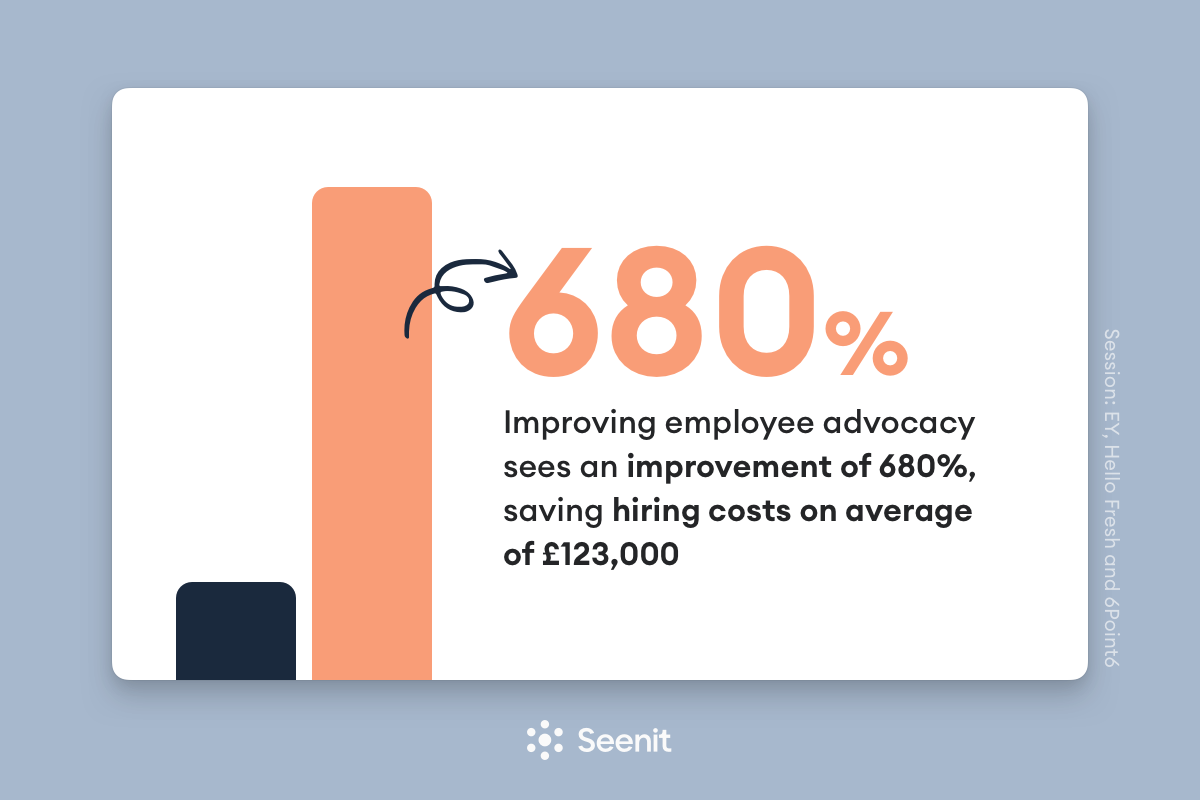
By investing in improving employee advocacy, organisations have seen significant savings in hiring costs.
Employer Branding as everyone’s business
One key insight shared by the Head of Employer Branding at Lidl was that employer branding is not solely the responsibility of the branding team.
“Employer Branding is not only employer branding, it’s everyone’s business, an interdisciplinary topic and an integral part of a people strategy”
Catherine Gouw, Head of Employer Branding International, Lidl
Lidl’s way to data-driven Employer Branding
Every individual within an organisation has a role to play in building and promoting the employer brand. By fostering a culture where employer branding is everyone’s business, organisations can create a unified and authentic brand image that resonates with both current and prospective employees.
Building an effective Employee Value Proposition (EVP)
Sarah and Jona from Ledger emphasised the importance of building a strong Employee Value Proposition (EVP). They highlighted that Talent Operations and Employer Branding should work closely together to develop an EVP that reflects the organisation’s values and resonates with the target talent pool. It is crucial to involve employees and talent acquisition professionals at every step of the way when building or updating the EVP.
“The recruiters can add vast value, they are on the ground hearing what’s important, what people are saying, and they are able to give real time feedback so you can iterate your content. Get your recruiters intimately involved.”
A story of shifting gears in TA: How building our EVP in-house changed our team culture
A strong EVP has numerous benefits, including reducing hiring costs, attracting high-quality candidates, and improving employee retention rates.
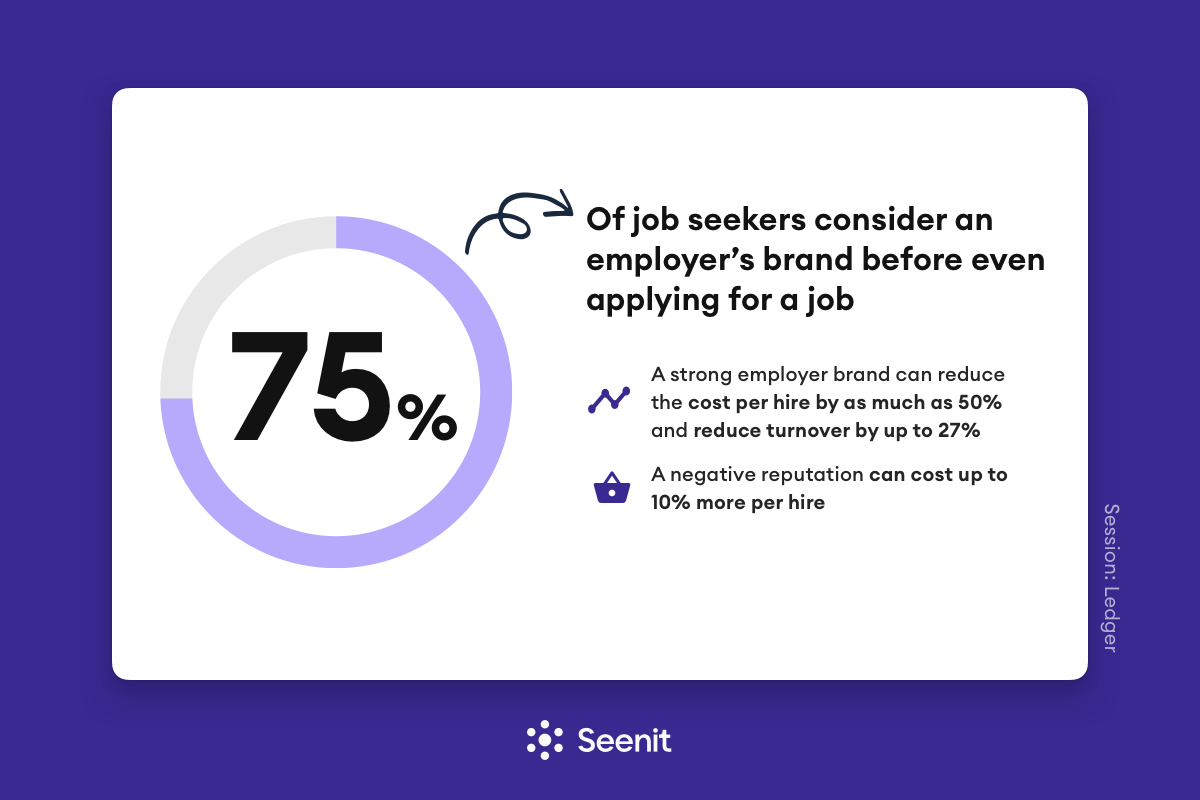
Enhancing candidate experience and job descriptions
Barclays & Radancy shared insights on the impact of candidate experience and job descriptions on employer branding. They found a clear correlation between a candidate’s ability to find the information they are looking for on a career site and their perception of the employer. Plus, candidate priorities have shifted from aspirational to basic needs in recent years.
“Candidate priorities have changed from ‘aspirational’ to ‘basic needs’ in the last 3+ years”
Cracking the Candidate Code - Unveiling Exclusive Insights from 1.5 Million Job Seekers to Build Powerful Talent Acquisition Strategies
To create a positive candidate experience, organisations should focus on providing concise and accessible job descriptions that capture the essence of the role and the organisation’s culture.
Community engagement and proactive sourcing
Another key takeaway from the event, was a discussion on the importance of community engagement and proactive sourcing. Creating a talent community and engaging with candidates beyond transactional interactions can yield significant benefits.
“If you are really serious about building a community, you need a dedicated person or team to do it so it isn’t periodic, recruiters can support and market with you but you need to invest in someone to really care about the candidate to be thinking and running that full time”
Samantha Ramsay, Head of Experienced Hire UKI @ EY
How did EY 10x a Niche Talent Community?
It was emphasised that organisations should provide value to the community before asking for something in return. Additionally, AstraZeneca highlighted the use of conversational AI as a key factor in achieving impossible hiring growth and high acceptance rates.
Diversity, Equity, and Inclusion (DE&I) in Employer Branding
DE&I emerged as a critical aspect of employer branding during the event. Panelists discussed the importance of authentic and transparent messaging regarding DE&I efforts. They highlighted that employers need to demonstrate their commitment to equity and inclusion as Gen Z candidates, in particular, conduct thorough research to assess the authenticity of employer statements.
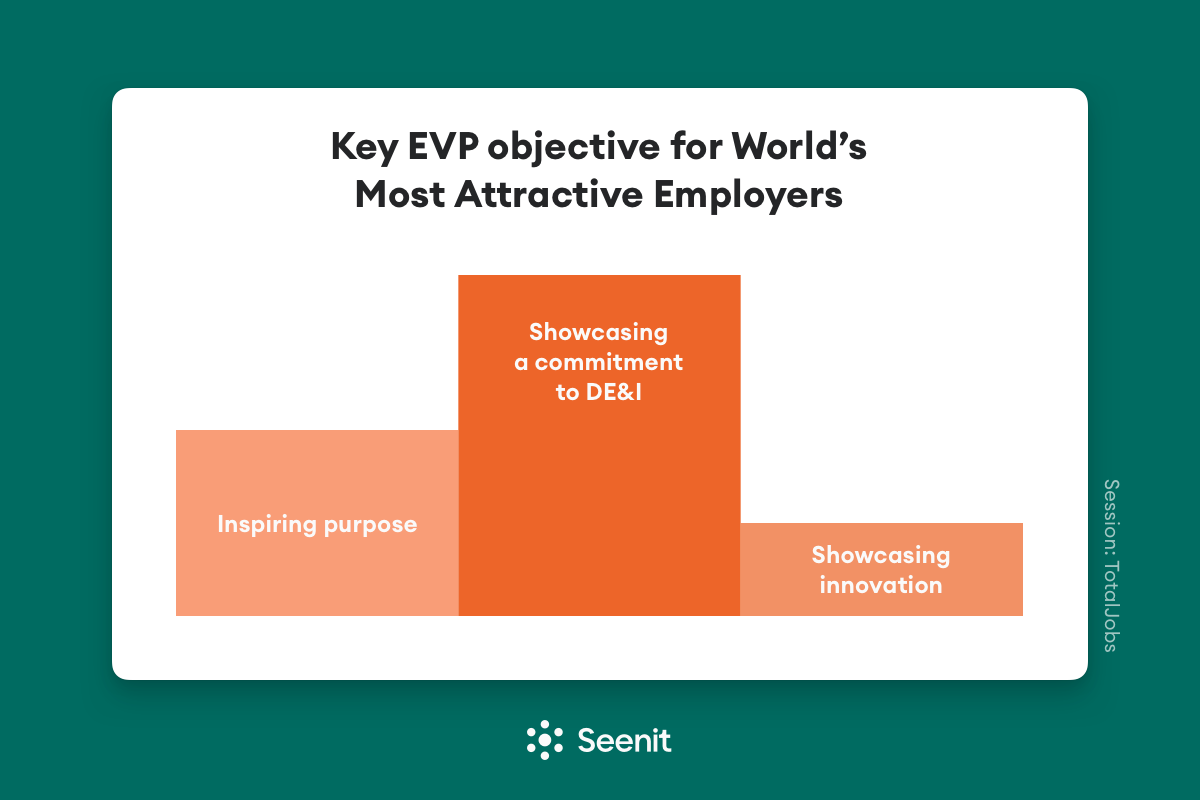
“Employers need to be authentic in the message they put out, as they will get called out if they don’t have underlying forward movements when it comes to equity. They need to be conveying authentic messages.”
Isa Wurie, Employer Branding Consultant & DE&I Specialist at Universum Global
Unpacking the now and next in employer branding
Additionally, it was noted that sustainability initiatives and DE&I efforts play a significant role in attracting top candidates, especially from the Gen Z pool.
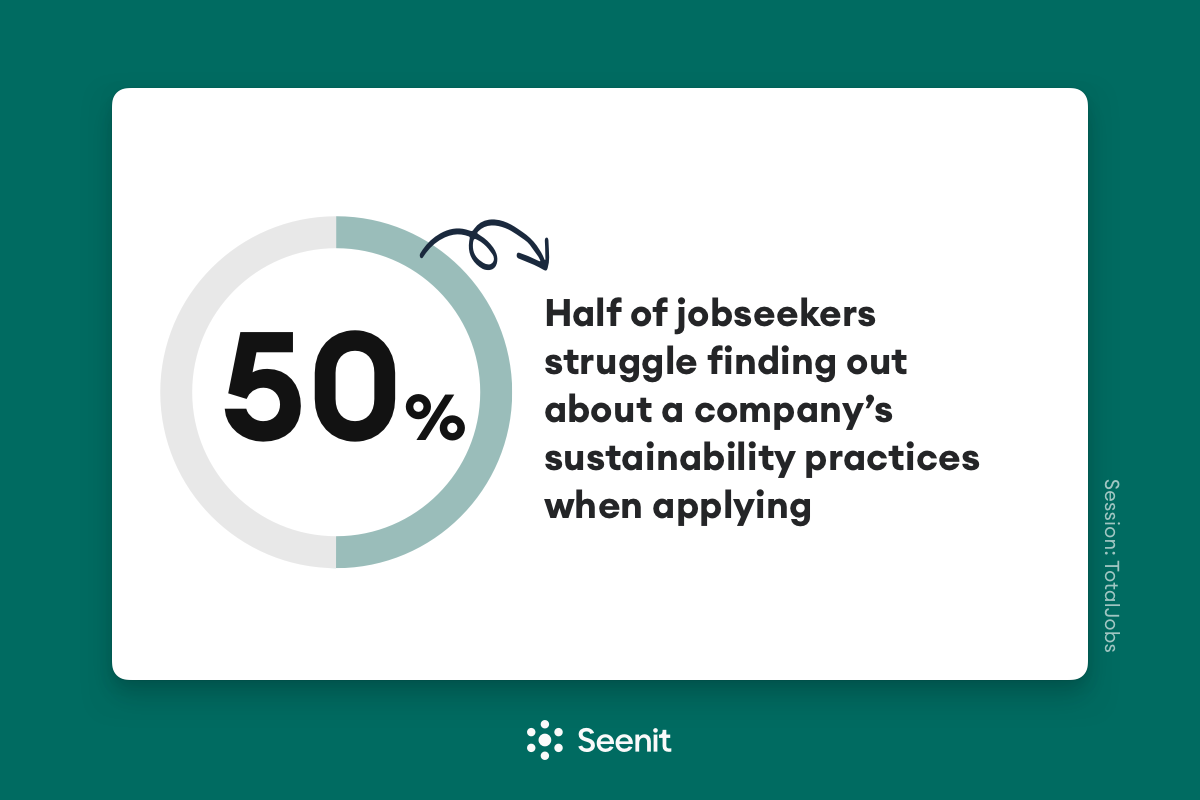
Understanding Gen Z’s holistic priorities and expectations
Speaking of Gen Z, a specific focus was placed on understanding this unique generation in the workforce.
“Gen Z is a generation with holistic human priorities, seeking more balance. A driven generation that expects more from their work. A generation seeking change.”
Ace Mamun, EMEA Marketing at JobTeaser
European Gen Z Relation to Work
Gen Z employees have a propensity for change, with 1 in 2 planning on leaving their current role within two years or less. 88% also stating that work/life balance would be key to making them stay. This emphasises the need for organisations to adapt and cater to the evolving expectations and aspirations of this generation.
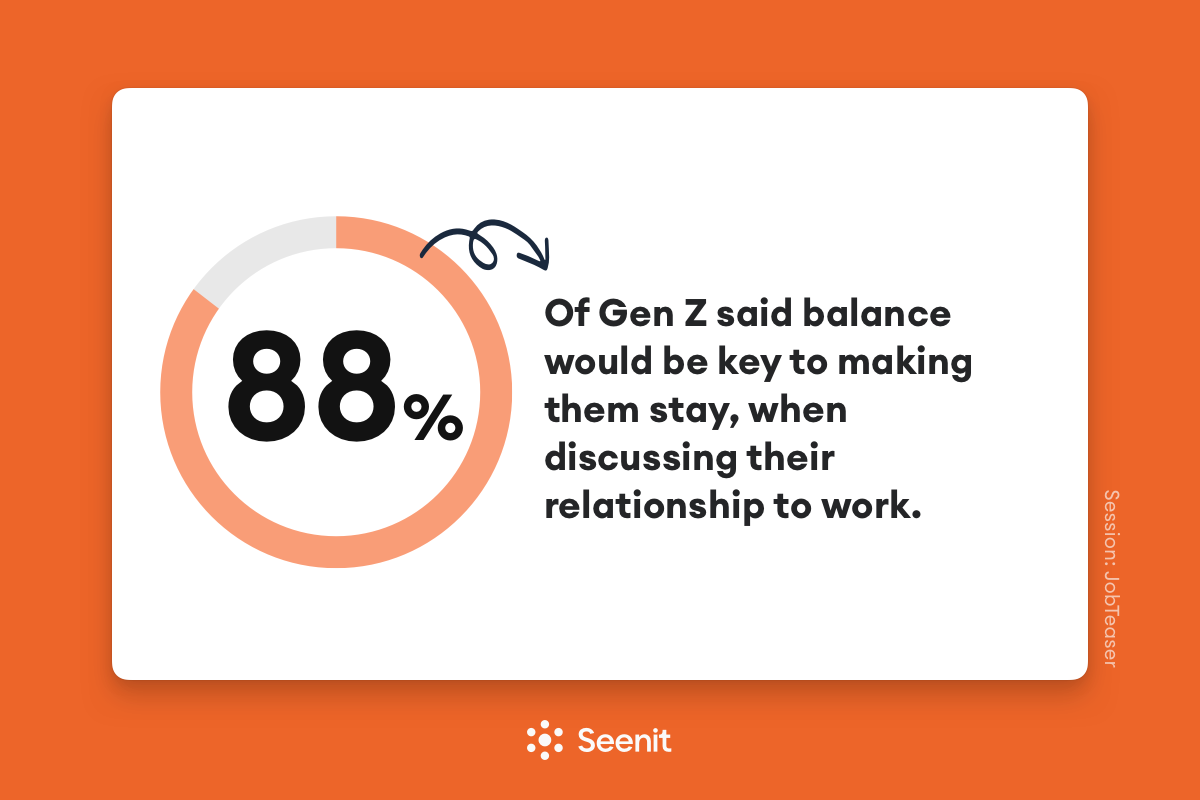
Gen Z also demonstrates a keen interest in utilising AI in the workplace and are 1.7 times more likely to use AI compared to other generations. To attract and retain Gen Z talent, organisations should align their employer branding strategies with the holistic priorities of this generation. By offering a conducive work-life balance, growth opportunities, and incorporating AI-driven tools, companies can effectively engage and motivate Gen Z employees, positioning themselves as attractive employers for the future workforce. Understanding and catering to the unique needs of Gen Z is crucial for building a strong employer brand that resonates with this talent pool.
Summary
Recfest provided valuable insights into the world of Talent Acquisition. By prioritising content development tools, leveraging employee advocacy, fostering collaborative employer branding efforts, developing a strong EVP, enhancing candidate experience, engaging with communities, championing DE&I initiatives and understanding Gen Z workers, organisations can create a compelling employer brand that attracts top talent. We encourage you to apply these key takeaways to your own employer branding strategies and stay ahead in the competition to attract and retain the best talent.
Remember, employer branding is not just a buzzword; it is a strategic imperative that can drive your organisation’s success in today’s competitive talent landscape.




